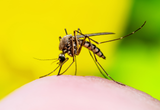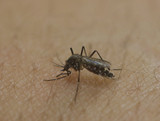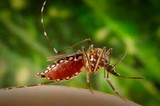Help eliminate Dengue from Rockhampton
UPDATE: 6 more cases of Dengue fever confirmed
CHRISTINE MCKEE and Stephanie Allen
31st May 2019 10:32 AM
UPDATE 12PM: The six new cases of dengue fever confirmed in Rockhampton have been confirmed as being found on Richardson Rd, Main St and Glenmore Rd in Park Avenue.
Health authorities are urging locals, particularly in the Park Avenue area, to be vigilant by implementing control measures in and around their homes, and being aware of symptoms.
Environmental Health Services, Central Queensland Hospital and Health Service manager Paul Florian said following last week's house inspections, where 262 homes were visited, six more people exhibiting symptoms of dengue fever were identified.
After following up with these persons who were showing "mild symptoms", they were confirmed to have the virus. All seven patients are now well.
There is a chance that more cases will be found.
Further house to house inspections are being conducted today, as there is a possibility there may be further cases of dengue fever within the area.
Mr Florian said of the 262 homes visited last week, 13 per cent of those had mosquito breeding and six per cent of those premises had the dengue mosquito.
"Fifty per cent of the premises that had mosquito breeding had the dengue mosquito which is quite a high number," he said.
"We'd like people to help us control the dengue mosquito by emptying containers that hold water or better still getting rid of containers that hold water."
The containers may include ice cream containers, buckets, tin cans, gutters, pot plant saucers, and bird baths.
Mr Florian said mosquitoes lay eggs on the side of containers, and will remain viable up to 12 months.
"We ask people to empty them at least once a week and scrub with a scrubbing brush to remove any eggs that might be there so that when (the containers) fill up with water again, they don't hatch the eggs and form more adult mosquitoes," he said.
Warmer weather accelerates the breeding process of dengue mosquitoes, and although the cooler weather is expected to slow down the rate of the life cycle, it is not expected to stop the breeding.
Mr Florian said dengue mosquitoes don't tend to travel far from water sources.
"Dengue mosquitoes like to live where people are and they have a flight range of 50-100m. It can be up to 200m but they don't travel far," he said.
"It doesn't like crossing main roads. Our road carriage ways are like a good fence line for mosquitoes."
Symptoms of dengue fever include sudden onset of fever, extreme tiredness, intense headache, muscle and joint pain, loss of appetite, vomiting, diarrhoea, abdominal pain, rash, minor bleeding from the nose or gums and/or heavy menstrual periods.
Symptoms can range from mild to severe.
CQ Public Health Unit director Dr Gulam Khandaker said although there is no active treatment for dengue fever, those exhibiting symptoms should take pain relief medication and visit their GP or a health professional.
"Dengue fever cannot be transferred from person to person," he said.
"Once infected, the virus remains in the person's symptom for 10-12 days active and then if the person gets bitten by a mosquito, it can remain in the mosquito's muscular system for a life time.
"Don't get bitten by mosquitoes and get rid of mosquito breeding sights in and around your house."
EARLIER: SIX further cases of dengue fever cases have been identified in Rockhampton following intensive surveillance and control activities in the past week.
A comprehensive dengue management plan has been implemented as part of the current Dengue outbreak response and health professionals say it is possible more cases may be found.
No details will be publicly provided on individual cases, but all have physically recovered.
Paul Florian, manager of environmental health services at Central Queensland Hospital and Health Service says there is no need for residents to panic, but it is very important that home owners right across Rockhampton take every measure to keep their yards free of stagnant water to prevent the breeding of mosquitoes.
Central Queensland Public Health Unit along with Rockhampton Regional Council is taking mosquito control measures to limit the outbreak from spreading.

This involves searching for mosquito breeding sites, trapping programs and applying residual pesticides.
It is also important to avoid being bitten by mosquitoes using repellents, mosquito coils or plug-in repellent devices. Wear long-sleeved light coloured clothing and cover your feet.
Aedes aegypti (dengue-transmitting) mosquitoes are present in Rockhampton, however, locally acquired cases do not usually occur.
Dengue fever is confirmed through blood tests which take up to seven days for verification.
Dengue mosquitoes live and breed around domestic premises and bite during the day.
Symptoms of dengue fever include sudden onset of fever, extreme tiredness, intense headache, muscle and joint pain, loss of appetite, vomiting, diarrhoea, abdominal pain, rash, minor bleeding from the nose or gums and/or heavy menstrual periods. They can range from mile to severe.
Anyone with these symptoms should see their GP immediately to discuss the need for a dengue fever test.
More information on dengue fever is available online at https://www.health.qld.gov.au/clinical-practice/guidelines-procedures/diseasesinfection/
Recent Posts
-
NSW Health strongly recommends being vaccinated against Japanese encephalitis virus
Residents in the Lismore, Richmond Valley and Kyogle shires are being encouraged by NSW Health to vi …18th Nov 2025 -
Mosquito-borne viruses triple in Queensland as La Niña provides ideal breeding conditions
In short:2024 saw the highest number of mosquito-borne virus cases in Queensland in four years, acco …29th Jan 2025 -
Climate change and chemicals on your skin put you at greater risk of getting bitten by a mosquito
Climate change and extreme weather have the potential to increase cases of mosquito-borne diseases a …8th Nov 2024




